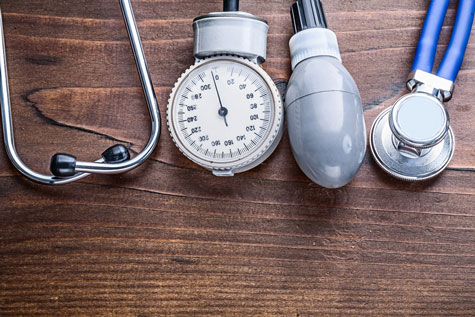Most of us worry about high blood pressure. And for good reason. It leads to heart disease and increases your risk of stroke and early death.
That’s why millions of Americans take hypertension medications. But a Harvard University analysis recently revealed a new danger associated with these drugs.1
Optimal blood pressure is about 120/80. After age 60, these numbers increase slightly. But when blood pressure is more than 140/90, doctors usually recommend medication to lower it.2
Harvard researchers analyzed two major studies and found that lower blood pressure is not always better.
One study followed more than 11,000 adults for 30 years. None of the participants had heart disease at the beginning of the study. They averaged 57 years of age.3
Scientists found that people with slightly low diastolic blood pressure (the lower number) of 60 to 69 mm/Hg were not healthier. In fact, they were 2.2 times more likely to have heart damage as people with diastolic blood pressure between 80 and 89.
A second study collected data on more than 22,000 people with heart disease from 45 countries. It was published in the journal The Lancet.
As expected, they found that people with systolic blood pressure (the upper number) of 140 or higher and diastolic blood pressure higher than 80 were more likely to suffer heart attacks or strokes.
But there was another, more surprising finding…
If patients’ systolic blood pressure was below 120 and diastolic below 70, they faced the same increased health risks as people with high blood pressure.4
Surprising Way Hypertension Drugs Threaten Your Health
Dr. Paul Conlin is a professor of medicine at Harvard. He led the blood pressure analysis.
Low blood pressure may cause clogged arteries because blood is not moving with enough force to clear debris from blood vessels, he said.
Whether you are lowering your blood pressure through natural means or with a drug, make sure your lower (diastolic) number doesn’t consistently fall below 70, Dr. Conlin advises.
For the upper (systolic) number, “I tend to be comfortable with a value of around 130,” he said. Going lower carries an increased risk of side effects, such as lightheadedness, and the same long-term problems as high blood pressure.
Editor’s Note: Something strange was happening to pilots training to fly F-16 fighter jets. The ones who went into the program with elevated blood pressure were coming out a few weeks later with normal, healthy readings.
They hadn’t taken any medications… Their diets hadn’t changed… And they hadn’t made any changes to their exercise regimens.
Go HERE to discover their secret—and how you could lower your blood pressure up to 15 points from your living room using this same trick.
Like this Article? Forward this article here or Share on Facebook.
References:
1 http://www.health.harvard.edu/heart-health/can-your-blood-pressure-be-too-low?utm_source=delivra&utm_medium=email&utm_campaign=WR20170707-Cholesterol&utm_id=557639&dlv-ga-memberid=28035839&mid=28035839&ml=557639
2 http://www.heart.org/HEARTORG/Conditions/HighBloodPressure/GettheFactsAboutHighBloodPressure/The-Facts-About-High-Blood-Pressure_UCM_002050_Article.jsp
3 http://www.mdedge.com/ecardiologynews/article/116196/cad-atherosclerosis/study-links-low-diastolic-blood-pressure
4 http://www.health.harvard.edu/heart-health/can-your-blood-pressure-be-too-low?utm_source=delivra&utm_medium=email&utm_campaign=WR20170707-Cholesterol&utm_id=557639&dlv-ga-memberid=28035839&mid=28035839&ml=557639

